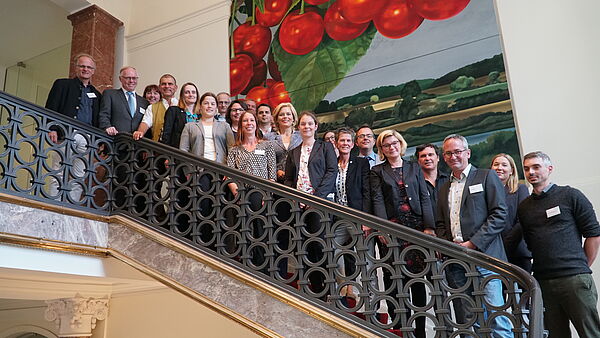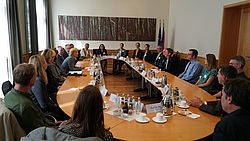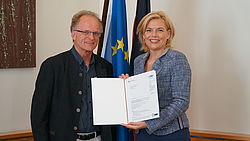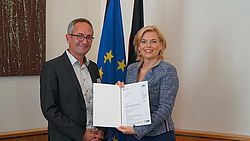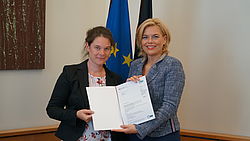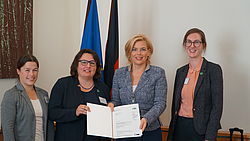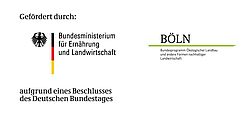Berlin, Geisenheim September 10, 2019
The number of organically cultivated vineyards has grown steadily in recent years. An increasing number of winegrowers are interested in this topic and have started to change their practices, and the results are impressive: with almost 10 percent of vineyards in Germany now being run organically, this figure is set to increase. What is more, a growing number of organic wines feature in the top rankings of many competitions. The federal government's strategy for the future of organic argiculture sets out a target of 20 percent for organic farming. In some federal states the governing parties have set even more ambitious targets. A recent study by the Johann Heinrich von Thünen Institute, a federal research institute for rural areas, forestry and fisheries, has shown how productive organic farming is: hundreds of research findings from the past 30 years were scrutinized and the results confirm that organic is clearly ahead when it comes to climate, soil and water protection as well as biodiversity and the efficient use of resources.
One of the greatest challenges in organic viticulture is plant protection, in particular, combatting grapevine downy mildew – also known as Plasmopara viticola – which can be a cause for concern in wet years. Many winegrowers interested in changing over to organic production shy away from the final step in the certification process out of fear that they will be left helplessly exposed to adverse conditions. Copper is the tool of choice in keeping this aggressive fungus in check. However, the use of a heavy metal like this needs to shift in favour of more ecologically sound control methods sooner rather than later, and should even replaced altogether over the medium to long term. This is where the VitiFIT Project comes in: over the next five years, it plans to work on improving planning security for organic wineries. The cooperation of the partners in the project will ensure a holistic approach. The project is being funded by the German Federal Ministry of Food and Agriculture based on a resolution passed by the German Bundestag as part of the federal ecological argiculture program and other forms of sustainable farming.
VitiFIT is divided into four subject areas. Subject area A comprises the development, optimization and establishment of processes and technical solutions in organic viticulture, with the aim of improving and stablizing grapevine health. In this context, the focus will be on Plasmopara viticola. Subject area B is concerned with the ongoing development of breeding activities in relation to fungus-resistant grape varieties (PIWI), strategies for the varieties, and bringing them onto the market. Subject area C will focus on expanding the "VitiMeteo Rebenperonospora" forecasting system, already well established within the wine-growing industry, to include additional aspects and requirements of organic winegrowing and PIWI varieties. Subject area D is about involving the various parties concerned and knowledge transfer. VitiFIT has been devised as a practical research project. Feedback from the winegrowers is of central importance. The project was preceded by a two-year planning phase.
"We are quite proud that VitiFIT has been successfully launched together with such a large consortium", said Beate Berkelmann-Löhnertz, project coordinator and Professor at Hochschule Geisenheim University (HGU). Aside from HGU, Weincampus Neustadt, Friedrich-Alexander-Universität Erlangen-Nürnberg, Julius Kühn-Institut Siebeldingen, and the rural area service centers (DLR) for the Rheinhessen-Nahe-Hunsrück and Rheinpfalz regions are participating in the project. Weinbauinstitut Freiburg and the Bavarian State Institute for Viticulture and Horticulture (Bayerische Landesanstalt für Wein- und Gartenbau) in Veitshöchheim round off the state-run institutions involved in VitiFIT. Given their close ties to the agricultural industry, the organic farming associations Bioland, Demeter, ECOVIN and Naturland are key partners in the consortium. Other partners on the ground include companies such as Trifolio-M, uv-technik meyer gmbh and GEOsens GmbH as well as a number of well-known organic wineries which will function in a pilot and demonstration capacity. Many of the participants have known each other for several years and have already worked together in various groupings. "We are happy to have this unique opportunity to work together on additional components for sustainable winegrowing practices and to make winegrowing more ecological. The planned funding of over 6.3 million euros shows that the federal government is giving a clear signal in this regard. It goes without saying integrated viticulture will be benefit significantly from the results of this joint project", said Beate Berkelmann-Löhnertz as she thanked Federal Agriculture Minister Julia Klöckner, who embraced the opportunity to hand over the official notification of the funding in person in Berlin.
Contact: Professor Beate Berkelmann-Löhnertz, Hochschule Geisenheim University, Department of Crop Protection, Beate.Berkelmann-Loehnertz@hs-gm.de

